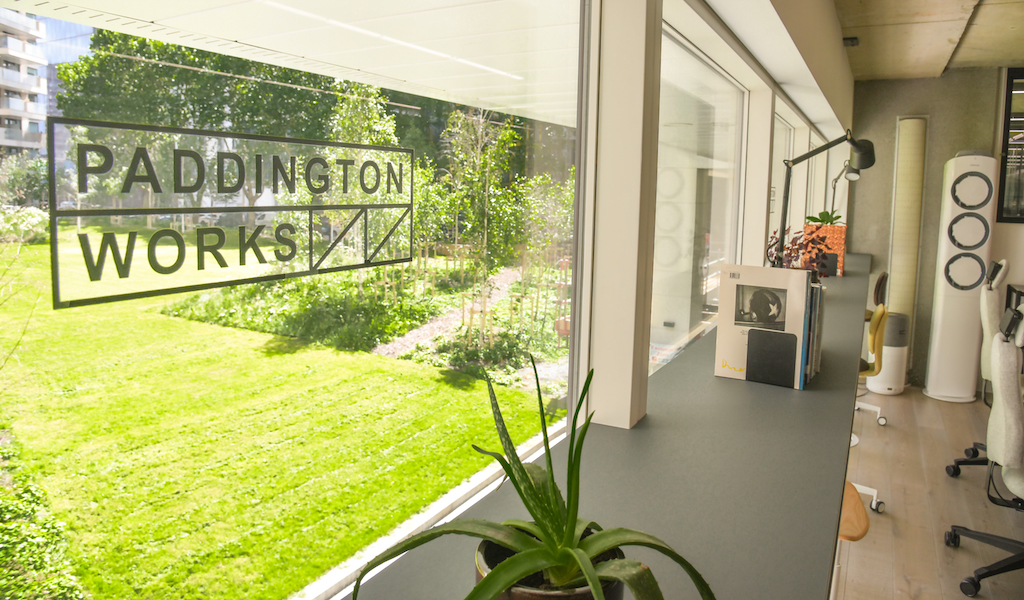
Green Space in Your Workplace: How Plants Boost Productivity and Wellness in the Workplace
“Biophilic design can reduce stress, enhance creativity and clarity of thought, improve our well-being and expedite healing; as the world population continues to urbanise, these qualities are ever more important.”
– 14 Patterns of Biophilic Design, Terrapin Bright Green

At Paddington Works, we take pride in providing you with a clean and healthy environment. Our space is adorned with various plants, air purifiers, and fresh air systems to ensure your well-being. We regularly measure the air quality within our premises and always strive to maintain a “super green” Air Quality Index rating.
We get told time and time again that plants in the office works wonders for your mental health and productivity. I think we all agree that they do, but how many of us actually know why?
At Paddington Works, we made it a design choice to make space for plants and natural elements in the workplace for both of those reasons…and more.
The design philosophy behind it comes from biophilia or biophilic design. It’s a concept used to increase wellbeing through exposure to nature. According to American biologist Edward O. Wilson, it is in our DNA to focus on and affiliate with nature and other life forms. It’s no wonder that incorporating natural elements such as plants, natural light, water, and materials that simulate natural environments can elevate your average 9 to 5 experience.
When designing Paddington Works, we wanted to invite the outside in. This is how we did it, why we did it, and how biophilia is aiding your work day!

Studies have shown that exposure to plants and natural light can help to reduce stress and anxiety levels in individuals.
Incorporating Natural Light
Much of our building is bathed in natural light. We even have circadian lighting installed in the building – a system that adjusts to the time of day to keep your body’s circadian rhythm working in tune.
Dr Ian Alcock, lead researcher from the University of Exeter, found that people who had a view of nature, have significant and long-lasting improvements in mental health. (Alcock, 2014)
Similarly, a study by the University of Oregon found that exposure to natural light in the workplace led to improved cognitive function and reduced levels of drowsiness.

Fresh Air Flow
Research shows that poor air quality has a significant impact on our productivity and concentration.
Paddington Works is home to an advanced air system that brings in 25% more fresh air than standard building requirements.
We regularly measure the air quality inside Paddington Works to make sure we’re achieving a “super green” Air Quality Index (AQI) rating – an almost unheard of rating for commercial spaces in Central London.
Plants
Plants are natural air purifiers. They can help remove toxins and pollutants from the air, making the environment cleaner and healthier for you. At Paddington Works, we have made a conscious effort to incorporate plants into our workspace, aiming to enhance indoor air quality.
There are numerous studies that highlight the benefits of having plants in your workplace. Professor Margaret Burchett and Dr Fraser Torpy from the University of Technology in Sydney found that people who had plants in their workspace reported lower levels of stress and fatigue compared to those who didn’t have any plants. (Burchett & Torpy, 2014)
Another study, this time by the University of Michigan, discovered that people who had plants in their place of work were able to complete tasks with greater speed and accuracy compared to those without any green companions. (Berman et al., 2008)
Research has also shown that exposure to plants can help stimulate the brain, leading to increased creativity and innovation. A study by the University of Groningen found that employees who had plants in their workspace were more likely to generate creative ideas than those who did not have any plants.
There is no doubt that the benefits of biophilia at Paddington Works are clear. From reducing stress and improving air quality to increasing productivity and creativity, incorporating biophilic design into our workspace has a proven positive impact on your health, wellbeing, and job satisfaction.

Bibliography
Burchett, M. and Torpy, F. (2014) UTS science in focus: How humble houseplants can improve your health, YouTube. YouTube. Available at: https://www.youtube.com/watch?v=zm3PQeCXFCI&t=4s (Accessed: April 27, 2023).




